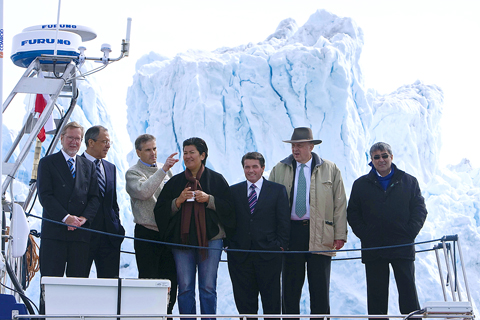Environmentalists denounced on Wednesday as a territorial “carve-up” a deal signed by five Arctic countries seeking to resolve competing claims for control of the polar region.
The agreement was signed in Greenland by ministers from Russia, the US, Norway, Denmark and Canada, and sought to cool down an increasingly heated scramble for the Arctic driven by the prospect of oil and gas reserves made newly accessible by the melting of the polar icecap.
Last year, Russia sent a submarine under the icecap to plant a national flag on the seabed to underline its territorial claims. Denmark has planted a flag on Hans island, a territory which Canada also has claims on; it has announced plans to set up a military training base and a deep sea port in the disputed region.

PHOTO: AP
Wednesday’s declaration said that all five countries would abide by the 1982 Law of the Sea, which determines territorial claims according to coastlines and undersea continental shelves.
Thomas Winkler, head of the international law department in the Danish foreign ministry, said: “The main point is that the five coastal states have sent a very clear political signal to everybody that we will manage the Arctic responsibly, that we have the international rules necessary and we will all abide by those rules.”
But environmentalists said the closed-door meeting paved the way for a land grab by countries who have claims to the continental shelf at the Pole.
Iceland, Finland and Sweden, who are part of the Arctic Council group of countries, but who do not have similar territorial claims were excluded, as were environmental groups and the native Inuit.
“It’s clear what’s going on. They are going to use the law of the sea to carve up the raw materials, but they are ignoring the law of common sense. These are the same fossil fuels that are driving climate change in the first place,” Mike Townsley, a Greenpeace International spokesman said.
“The closed door nature of this is doubly troubling. It’s clear they know what they’re trying to do is unacceptable,” he said.
Environmentalists would like to see the Arctic protected by the same sort of treaty that applies to the Antarctic, which prevents drilling or military activity.
However, the Norwegian Foreign Minister Jonas Gahr Stoere argued that further international regulatory agreements were unnecessary.
“Those that say there is a legal vacuum in the Arctic are wrong because the UN law of the sea convention prevails in the Arctic as it does in other oceans,” he said.
The law of the sea is unlikely to resolve all the territorial disputes in play as the Arctic melts. Both Denmark and Russia claim the Lomonsov ridge running under the North Pole is part of their territory. The Danes are seeking to prove it is a geological extension of Greenland, a self-governing Danish territory.
Critics of the meeting also questioned the inclusion of the US, which has not ratified the law of the sea.

In the sweltering streets of Jakarta, buskers carry towering, hollow puppets and pass around a bucket for donations. Now, they fear becoming outlaws. City authorities said they would crack down on use of the sacred ondel-ondel puppets, which can stand as tall as a truck, and they are drafting legislation to remove what they view as a street nuisance. Performances featuring the puppets — originally used by Jakarta’s Betawi people to ward off evil spirits — would be allowed only at set events. The ban could leave many ondel-ondel buskers in Jakarta jobless. “I am confused and anxious. I fear getting raided or even

Eleven people, including a former minister, were arrested in Serbia on Friday over a train station disaster in which 16 people died. The concrete canopy of the newly renovated station in the northern city of Novi Sad collapsed on Nov. 1, 2024 in a disaster widely blamed on corruption and poor oversight. It sparked a wave of student-led protests and led to the resignation of then-Serbian prime minister Milos Vucevic and the fall of his government. The public prosecutor’s office in Novi Sad opened an investigation into the accident and deaths. In February, the public prosecutor’s office for organized crime opened another probe into

RISING RACISM: A Japanese group called on China to assure safety in the country, while the Chinese embassy in Tokyo urged action against a ‘surge in xenophobia’ A Japanese woman living in China was attacked and injured by a man in a subway station in Suzhou, China, Japanese media said, hours after two Chinese men were seriously injured in violence in Tokyo. The attacks on Thursday raised concern about xenophobic sentiment in China and Japan that have been blamed for assaults in both countries. It was the third attack involving Japanese living in China since last year. In the two previous cases in China, Chinese authorities have insisted they were isolated incidents. Japanese broadcaster NHK did not identify the woman injured in Suzhou by name, but, citing the Japanese

RESTRUCTURE: Myanmar’s military has ended emergency rule and announced plans for elections in December, but critics said the move aims to entrench junta control Myanmar’s military government announced on Thursday that it was ending the state of emergency declared after it seized power in 2021 and would restructure administrative bodies to prepare for the new election at the end of the year. However, the polls planned for an unspecified date in December face serious obstacles, including a civil war raging over most of the country and pledges by opponents of the military rule to derail the election because they believe it can be neither free nor fair. Under the restructuring, Myanmar’s junta chief Min Aung Hlaing is giving up two posts, but would stay at the